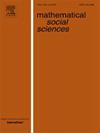Symmetry groups for social preference functions
IF 0.5
4区 经济学
Q4 ECONOMICS
引用次数: 0
Abstract
We introduce the anonymity group, the neutrality group and the symmetry group of a social preference function. Inspired by an unsolved problem posed by Kelly in 1991, we investigate the problem of recognizing which permutation groups may arise as anonymity, neutrality and symmetry groups of a social preference function. A complete description is provided for neutrality groups. In the case of anonymity groups, we derive a sufficient condition, which largely captures the desired class of objects. Our approach also is of relevance for the notion of representability by Boolean functions and, therefore, the results of this paper also shed some light on this field of study.
社会偏好函数的对称组
我们介绍了社会偏好函数的匿名组、中立组和对称组。受凯利在 1991 年提出的一个尚未解决的问题的启发,我们研究了如何识别哪些置换群可能作为社会偏好函数的匿名群、中立群和对称群出现。我们对中立组进行了完整的描述。对于匿名组,我们推导出了一个充分条件,它在很大程度上捕捉到了所需的对象类别。我们的方法也与布尔函数的可表示性概念相关,因此,本文的结果也为这一研究领域提供了一些启示。
本文章由计算机程序翻译,如有差异,请以英文原文为准。
求助全文
约1分钟内获得全文
求助全文
来源期刊

Mathematical Social Sciences
数学-数学跨学科应用
CiteScore
1.30
自引率
0.00%
发文量
55
审稿时长
59 days
期刊介绍:
The international, interdisciplinary journal Mathematical Social Sciences publishes original research articles, survey papers, short notes and book reviews. The journal emphasizes the unity of mathematical modelling in economics, psychology, political sciences, sociology and other social sciences.
Topics of particular interest include the fundamental aspects of choice, information, and preferences (decision science) and of interaction (game theory and economic theory), the measurement of utility, welfare and inequality, the formal theories of justice and implementation, voting rules, cooperative games, fair division, cost allocation, bargaining, matching, social networks, and evolutionary and other dynamics models.
Papers published by the journal are mathematically rigorous but no bounds, from above or from below, limits their technical level. All mathematical techniques may be used. The articles should be self-contained and readable by social scientists trained in mathematics.
 求助内容:
求助内容: 应助结果提醒方式:
应助结果提醒方式:


